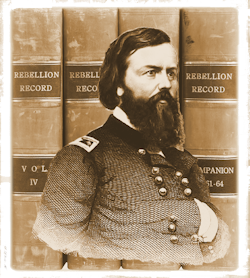February 21st.—A crowd collected here last night and there was a serenade. I am like Mrs. Nickleby, who never saw a horse coming full speed but she thought the Cheerybles had sent post-haste to take Nicholas into co-partnership. So I got up and dressed, late as it was. I felt sure England had sought our alliance at last, and we would make a Yorktown of it before long. Who was it? Will you ever guess?—Artemus Goodwyn and General Owens, of Florida.
Just then, Mr. Chesnut rushed in, put out the light, locked the door and sat still as a mouse. Rap, rap, came at the door. “I say, Chesnut, they are calling for you.” At last we heard Janney (hotel-keeper) loudly proclaiming from the piazza that “Colonel Chesnut was not here at all, at all.” After a while, when they had all gone from the street, and the very house itself had subsided into perfect quiet, the door again was roughly shaken. “I say, Chesnut, old fellow, come out—I know you are there. Nobody here now wants to hear you make a speech. That crowd has all gone. We want a little quiet talk with you. I am just from Richmond.” That was the open sesame, and to-day I hear none of the Richmond news is encouraging. Colonel Shaw is blamed for the shameful Roanoke surrender.¹
Toombs is out on a rampage and swears he will not accept a seat in the Confederate Senate given in the insulting way his was by the Georgia Legislature: calls it shabby treatment, and adds that Georgia is not the only place where good men have been so ill used.
The Governor and Council have fluttered the dove-cotes, or, at least, the tea-tables. They talk of making a call for all silver, etc. I doubt if we have enough to make the sacrifice worth while, but we propose to set the example.
![]()
______
¹ General Burnside captured the Confederate garrison at Roanoke Island on February 8, 1862.



